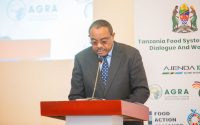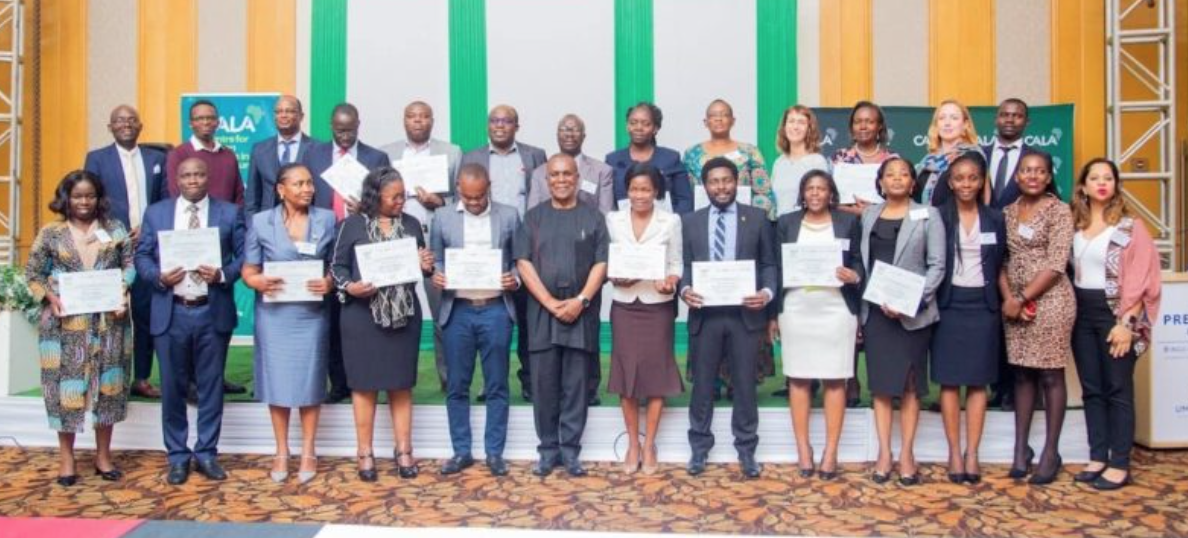President Samia: Tanzania Aims to Transform into an Agricultural Powerhouse by 2030; Seeks $1.8 billion for Building a Better Tomorrow (BBT) Program
*AGRA Chair Voices Support for Tanzania’s Green Growth Agenda
By Anthony Muchoki
President Samia Suluhu Hassan has articulated a clear vision for Tanzania, aiming to establish it as a top food producer in Eastern and Central Africa by 2030. She emphasized the importance of global support in addressing Tanzania’s climate change and sustainable development challenges.
“Tanzania intends to be a hub for food production in Eastern Central Africa. By 2030, we aim to grow the sector by 10%,” she stated at the Tanzania High-Level Side Event at COP28 in Dubai, focusing on “Meeting on Agriculture Opportunities for Green Growth Transformation in Tanzania.”
President Samia’s appeal for international support includes mobilizing $1.8 billion over the next seven years for the Building a Better Tomorrow (BBT) Program, which primarily engages youths and women. She highlighted the difficult balance Tanzania faces between climate action and sustainable development, particularly given the country’s reliance on rain-fed agriculture. “Striking a balance between climate action and sustainable development is challenging for Tanzania, a country of 61 million people, the majority of whom are youth making up 70% of the total population,” she noted.
President Samia detailed the transformative strategies for Tanzania’s agricultural sector, emphasizing the synergy between green growth and sustainable food production. She underscored the importance of aligning Tanzania’s agricultural practices with the global movement towards green growth transformation.
Echoing Tanzania’s ambitious goals, Hailemariam Desalegn, former Ethiopian Prime Minister and AGRA Board Chair, expressed strong support for Tanzania’s vision.
“We are very much convinced that Tanzania can feed not only its own people but also contribute significantly to the food needs of Africa and beyond, given its potential and the current leadership’s commitment to harnessing this potential,” Desalegn stated. He further affirmed AGRA’s commitment as a Pan-African institution to support ongoing programs in Tanzania, with a particular focus on the youth-driven BBT program.
The President pointed out that persistent weather uncertainties have severely limited productive farming days in Tanzania. This challenge drives many Tanzanians towards unsustainable practices like deforestation for firewood and charcoal. She stressed the need to scale up initiatives for sustainable changes in agricultural food systems and the importance of securing financial resources for transformative actions and innovations.
In her appeal for international support, the President called for assistance in mobilizing $1.8 billion over the next seven years. The funds will be utilized to transform agriculture in the country through a comprehensive seven-year plan, benefiting 1.4 million farmers, focusing on the development of irrigation projects and wells.
Acknowledging the World Bank’s support under the P4R initiative, she invited other partners to explore cooperation opportunities. “We are mobilizing $1.8 billion over the next seven years. We appreciate the World Bank’s support toward this project under the P4R. We call on other partners to explore cooperation with us on this important project,” the President stated.
She said the BBT program was designed to increase agricultural productivity and environmental protection, aiming to expand irrigation systems to cover 8 million hectares by 2030. This initiative aims to transform the agricultural sector, making it more sustainable and resilient to climate change.
President Samia also highlighted the program’s potential for job creation, especially for Tanzania’s youth, who are facing high unemployment rates. She emphasized that the BBT program would engage the youth, providing them with sustainable livelihoods. “The second target of the program is job creation. We know that 70% of our population in Tanzania are youth and most of them are jobless,” she remarked.
President Samia invited development partners, the private sector, and organizations promoting agricultural activities to collaborate with Tanzania. She emphasized Tanzania’s readiness to work with all willing partners in achieving these ambitious goals. “Tanzania is ready to work with everybody who is ready to work with us,” she stated, marking a call for global cooperation.
As the world grapples with climate change, developing countries like Tanzania face unique challenges. The nation’s reliance on agriculture not only makes it vulnerable to climate-related shocks but also presents an opportunity to spearhead sustainable agricultural development.


